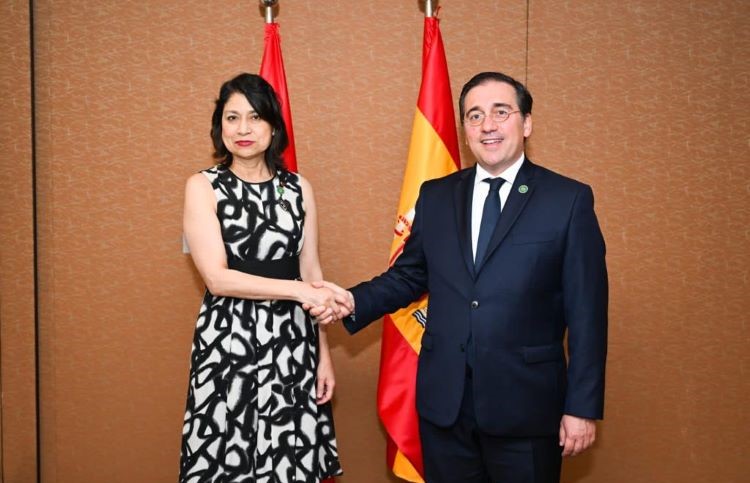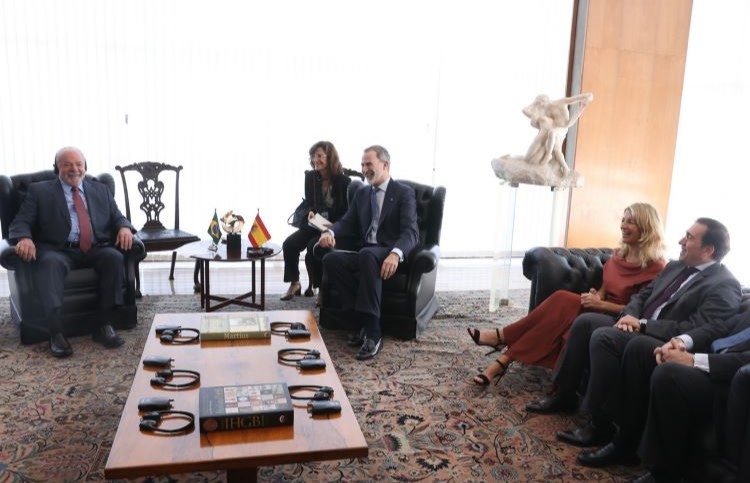The Diplomat
The defense of democracy and Spain’s support for the peace process were the focus of the two meetings held by the Minister of Foreign Affairs, José Manuel Albares, in Brasilia with his counterparts from Peru and Colombia, on the margins of the inauguration of the new President of Brazil, Luiz Inácio Lula da Silva.
On the one hand, Albares held on Sunday a “productive meeting” with his Peruvian counterpart, Ana Cecilia Gervasi, with whom he reviewed “bilateral relations” and to whom he thanked “the work of Peru for the next Congress of the Spanish Language (CILE)”, as reported by the minister through his Twitter account. Cadiz has recently assumed the celebration of the IX International Congress of the Spanish Language (CILE), which was to be held in Arequipa (Peru) between March 27 and 30, 2023 but will finally take place outside this Andean country as a result of the political crisis generated by the self-coup d’état of former president Pedro Castillo.
Precisely, Albares reiterated during the meeting in Brasilia “Spain’s support to democracy and the Constitution in his country” and Foreign Minister Gervasi (quoted in her own Twitter account) thanked Albares “for his permanent cooperation with Peru and support to the institutional democratic process in the country”. As reported by the minister through the same social network, Gervasi and the Peruvian Prime Minister, Alberto Otarola, also held a conversation with King Philip VI “on issues of common interest to both countries”.
Yesterday’s meeting was Albares’ first personal meeting with Gervasi, who took office on December 10 and was sworn in by President Dina Boluarte on December 21, replacing César Landa, who had resigned from the Ministry after the self-coup d’état.
Last December 23, Albares and Gervasi had a first telephone conversation in which the Spanish minister also reiterated “Spain’s support to democracy and the Constitution in Peru”. On December 7, the same day of the self-coup, the Spanish Government issued a communiqué in which it “firmly condemned the rupture of the constitutional order in Peru” and welcomed “the reestablishment of democratic normality”, after Pedro Castillo’s decision to dissolve the national Congress and decree a government of exception, which led to his dismissal, his arrest and his replacement by Vice-President Boluarte. In the same communiqué, the Ministry of Foreign Affairs assured that “Spain will always be on the side of democracy and the defense of constitutional legality”.
Colombia
On the other hand, José Manuel Albares held a meeting yesterday with his “good friend” and Colombian counterpart Álvaro Leyva “to review our strategic bilateral relations and EU-Latin America relations before the Spanish EU Presidency”. “I have reiterated to him Spain’s total willingness as an accompanying country to achieve peace in Colombia,” he said via Twitter.
Albares and Leyva held a meeting last October 27 in Buenos Aires -on the occasion of the EU and CELAC ministerial summit-, at the end of which the Colombian Foreign Minister informed that Spain will act as an accompanying country, and not as host, during the peace negotiations between the Colombian government of Gustavo Petro and the guerrilla of the National Liberation Army (ELN), which began last summer in Havana. Specifically, Leyva announced – and the Spanish Foreign Ministry later confirmed – that Spain “will facilitate the talks” by accompanying the process, but the negotiations will take place in Cuba.
In early August, the Spanish government expressed to the newly formed Colombian Executive of Gustavo Petro its willingness to assist in the peace negotiations. Also, at a press conference in late August during the official visit of Prime Minister Pedro Sánchez, Petro welcomed Spain’s offer to host the negotiations, but said that it was up to ELN leaders to decide where they would prefer to hold the talks. The Colombian government’s talks with the ELN began in 2017 in Quito (Ecuador), during the government of Juan Manuel Santos, and in 2018 they were moved to Havana, where the guerrilla’s main leaders are still based.







